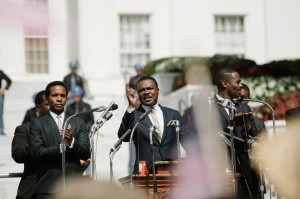
It’s hard to believe there hasn’t been a major motion picture film on the life of Martin Luther King Jr., until now. Although too short, King’s life was filled with events which have since become legendary in our history, from the Montgomery bus boycotts to his “I Have a Dream” speech on the steps of Washington. Yet, director Ava DuVernay strives far beyond these familiar moments in “Selma.”
Instead, the film follows King’s three months spent in Selma, Ala. in 1965, fighting for equal voting rights through a peaceful march. It’s in this deeply pinpointed approach that makes ‘Selma’ so special, delivering not only an honest, in-depth guise of Dr. King, but also bearing a narrative that couldn’t be more timeless and relevant today.
The film opens with the already iconic King receiving the Nobel Peace Prize in 1964 Sweden for his advances in civil rights. Though the youngest recipient of the award at the time, King is far from copasetic with his accomplishments. Haunted by the recent racially motivated murder of four black girls in an Alabama bombing, King realizes there is far more work to be done. British native actor, David Oyelowo, delivers an honest human portrayal of Dr. King. Reaching far beyond interpretation, Oyelowo creates an embodiment of character, driven by determination.
This spirit lands King a meeting with President Lyndon B. Johnson, played by Tom Wilkinson. While the Civil Rights Act of 1964 already outlawed any discrimination of race or color, Jim Crow laws were still heavily present in the southern states. This is shown early on, in a scene in which a black woman, played by Oprah Winfrey, is denied registration to vote by a racist employee, though she is legally entitled to vote. After Johnson refuses King’s plea to sign an equal voting rights act, it’s decided the matter must be faced in head on, in Selma.
Much like biopics“Milk” and “Lincoln,” “Selma” examines the strategic outlook through politics, as King vows to lead thousands on a 54-mile march from Selma to the state capitol building in Montgomery. This plan comes to a disliking of Johnson, who instructs the FBI to dismantle King’s life before the march is shown across TV news. While the bureau continues to track King’s movement and record his home, the bigoted Alabama governor George Wallace, played cartoonishly by Tim Roth, compiles his own method to cease the march from taking place.
On March 7th 1965, over 600 marchers attempted the 54-mile walk, only to be confronted by law enforcement, in attempt to shut it down. After the marchers refused to disperse, the state and local police attacked and beat the protesters to a pulp with nightsticks and tear gas, nicknaming the day “Bloody Sunday.”
The scene itself, while disturbing, becomes quite eerie in a sense of memorability. DuVernay presents images and ideas we’ve seen before, yet the connections are to be made ourselves. There’s something to be said about the unjustified murder of African Americans today, or to those who are still turned away from voting polls because of laws in place, or even unjustified spying from our government. “Selma” could have been made any time over the past 50 years, yet it’s significantly important it came out today.
Fresh off two small independent films, Ava DuVernay proves herself capable of handling a cast this diverse and large, while pouring an infinite amount of passion to the detailed events that resulted in the 1965 Voting Rights Act. With a cast this big, and a time period so short, some characters come off rather one dimensionally, as if some cartoon villain. Yet as Dr. King, Oyelowo breaks a wall through the icon, showcasing the legend not only as the civil rights leader we all know, but also as a father and husband.
The importance in “Selma” lies beyond how much King accomplishes in three months, but how little the rest of us have in half a century.
“Selma” will be released in select theaters Dec. 25, and elsewhere Jan. 9. Read an interview with David Oyelowo and Ava DuVernay here.





![DePaul sophomore Greta Atilano helps a young Pretty Cool Ice Cream customer pick out an ice cream flavor on Friday, April 19, 2024. Its the perfect job for a college student,” Atilano said. “I started working here my freshman year. I always try to work for small businesses [and] putting back into the community. Of course, interacting with kids is a lot of fun too.](https://depauliaonline.com/wp-content/uploads/2024/04/ONLINE_1-IceCream-1200x800.jpg)







